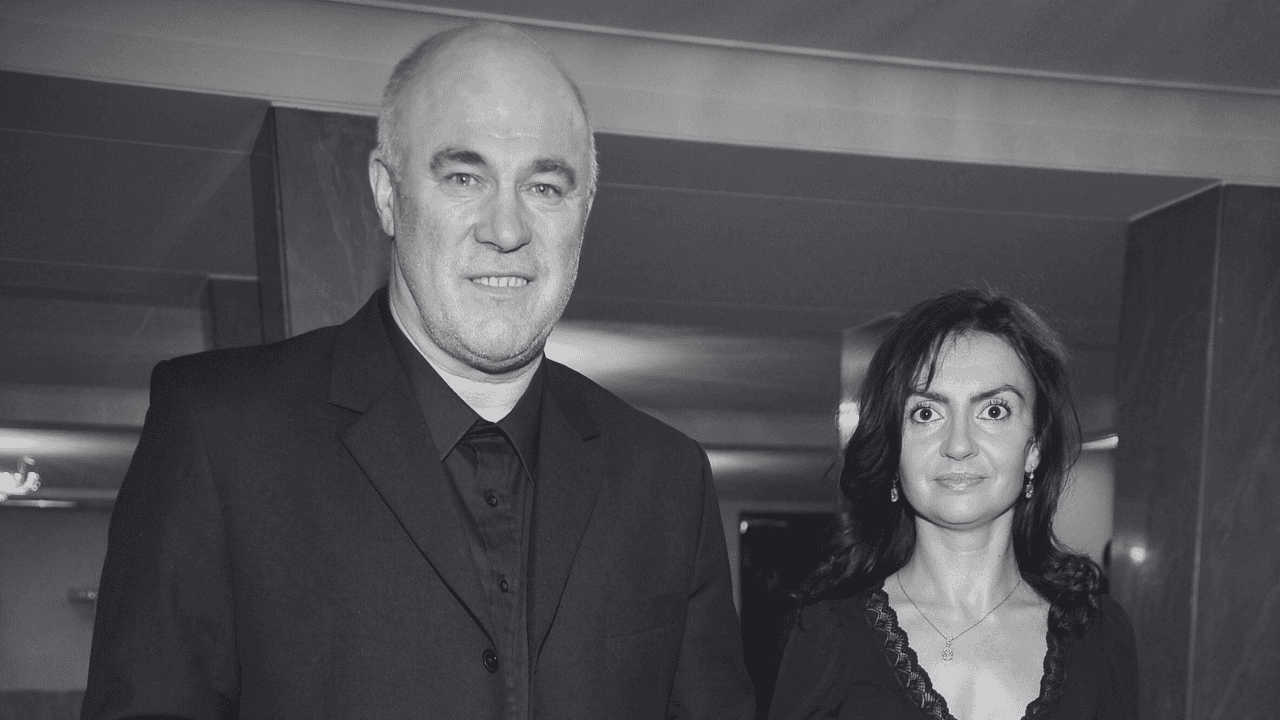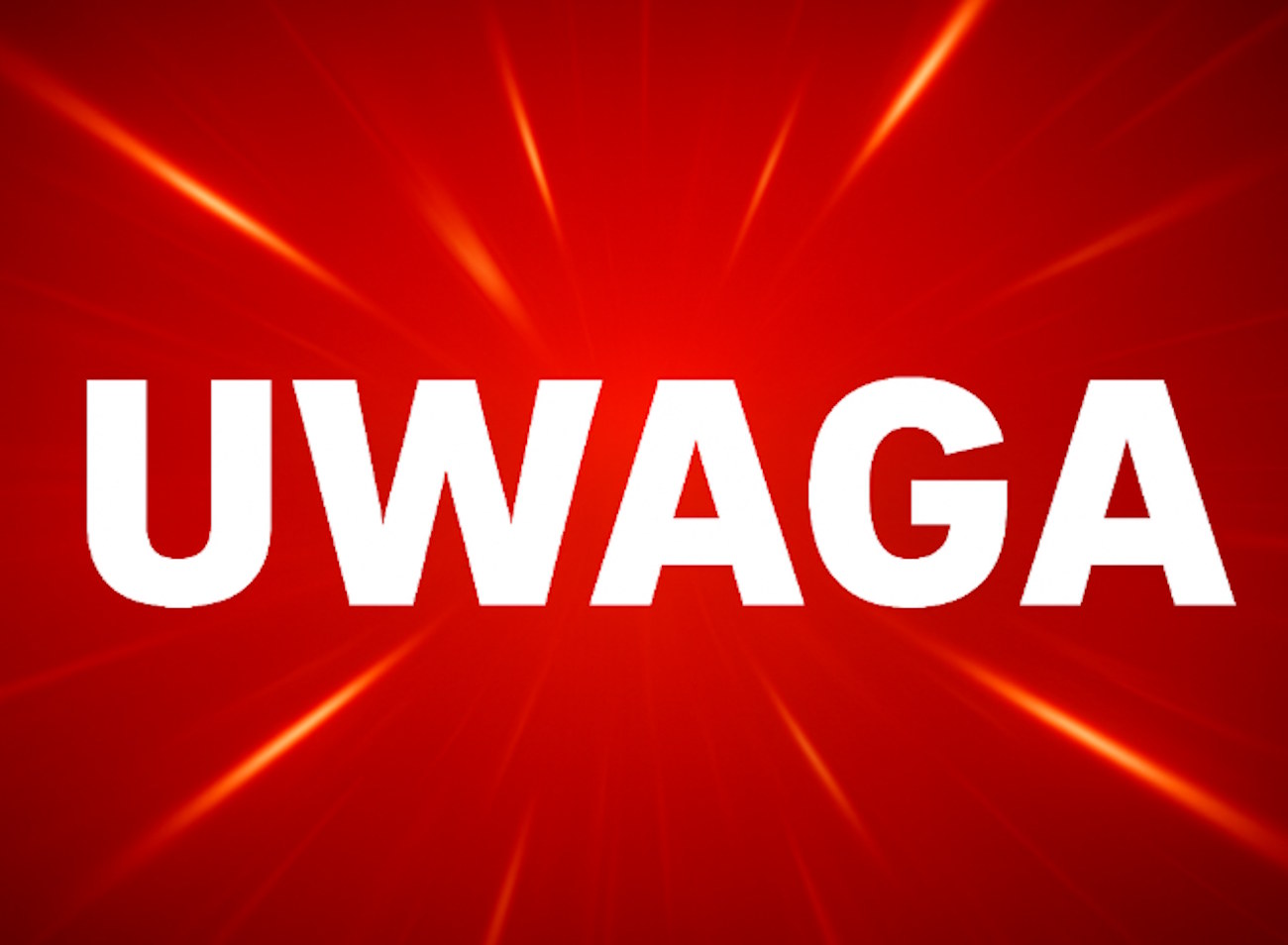
Пекин платит влиятельным лицам в Африке за распространение антиамериканских сообщений
Автор: Даррен Тейлор, The Epoch Times (выделено нами),
Йоханнесбург -Китайские и российские агенты платят влиятельным лицам в социальных сетях в Африке за распространение антиамериканских сообщений по всему миру, а администрация Трампа является главной целью.Об этом говорят эксперты СМИ.
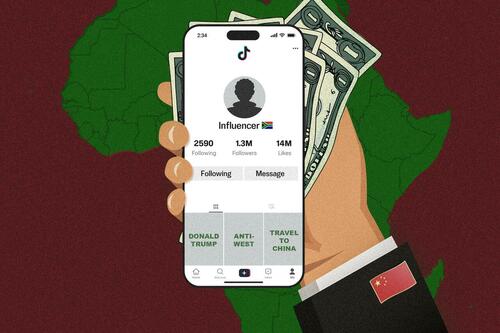 Изображение: The Epoch Times, Shutterstock
Изображение: The Epoch Times, ShutterstockИх исследование показывает, что многие влиятельные лица, использующие платформу TikTok, зарабатывают от сотен до тысяч долларов в месяц, распространяя дезинформацию, дезинформацию и пропаганду, которые приносят пользу Пекину и Москве.
Исследования согласуются с информацией, представленной Конгрессу 22 июля кандидатом президента США Дональда Трампа на пост главы вооруженных сил США в Африке.
Аналитики говорят, что Китай, Россия и другие злонамеренные субъекты Они пользуются информационной пустотой, созданной решением Белого дома сократить финансовую помощь Африке. Это повлияло на финансирование средств массовой информации, ранее поддерживаемых правительством США.
В 2024 году базирующийся в Вашингтоне Африканский центр стратегических исследований задокументировал почти 200 прокремлевских и прокитайских кампаний в социальных сетях в каждом крупном регионе Африки, причем влиятельные лица китайского режима особенно активны в Южной и Западной Африке.
Один из самых популярных социальных медиа в Африке рассказал The Epoch Times Она получает деньги на распространение информации, которая делает Россию и Китай «счастливыми». "
"В основном это сообщения о Трампе.Она попросила, чтобы ее имя было удержано, чтобы она не «разозлила» своих работодателей и не потеряла доход.
По ее словам, влиятельные лица, работающие в Москве и Пекине, получают онлайн-платежи через сайты, которые способствуют платным рекламным акциям.
"Деньги, которые мы зарабатываем, могут составлять несколько тысяч долларов каждый месяц; все зависит от того, насколько популярны наши посты.- сказала она.
Она сказала, что никогда не говорила со своими благотворителями.
Я не могу сказать вам, китайцы они или русские, или даже с Марса. Они отправляют мне данные, и я разбиваю их на сегменты, а затем публикую. Если им нравится то, что я пишу, они платят мне.
«Это не сложная работа, потому что их чувства совпадают с панафриканской философией, которая у меня есть, и я также являюсь сильным сторонником социализма и противником западного империализма.
"Думаю, именно поэтому меня завербовали, так сказать. То же самое можно сказать и о многих других влиятельных людях."
Исследование, проведенное Карен Аллен, консультантом Южноафриканского института исследований в области безопасности, также показало, что ключевым фигурам в африканской индустрии влияния платят за участие в так называемых «транснациональных скоординированных кампаниях», частично направленных на подрыв западных инициатив и лидеров.
Часть доклада Аллена была сосредоточена на южноафриканском влиятельном лице, который сказал, что российские агенты заплатили ему за усиление повествований, направленных на «дестабилизацию» Южной Африки во время выборов в стране в 2024 году.
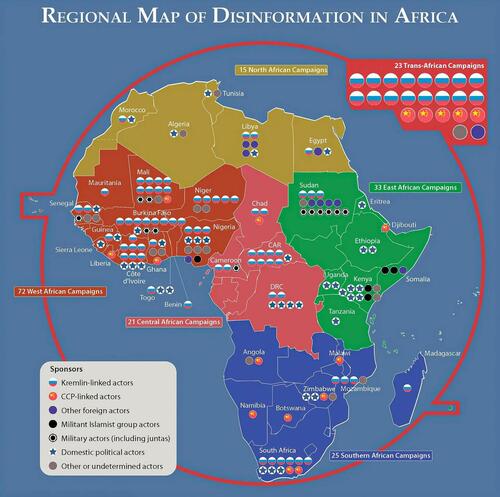 Карта 2024 года показывает спонсоров дезинформационных кампаний в Африке, которые с 2022 года выросли почти в четыре раза, подпитывая нестабильность и подрывая демократию. Африканский центр стратегических исследований / Скриншот Эпохальные времена
Карта 2024 года показывает спонсоров дезинформационных кампаний в Африке, которые с 2022 года выросли почти в четыре раза, подпитывая нестабильность и подрывая демократию. Африканский центр стратегических исследований / Скриншот Эпохальные временаЭтот влиятельный человек признал, что ему платили за материалы, которые приносили пользу кандидатам, которые были прокитайскими и пророссийскими, и за посты, которые очерняли западные партии.
Он сказал, что ему предоставили «предварительно упакованный материал» и платили почти 3 доллара каждый раз, когда ему нравился один из его постов. "
Профессор Герман Вассерман, который возглавляет отдел журналистики и медиа исследований в Университете Стелленбоша в Южной Африке, является еще одним экспертом, который раскрыл использование платных влиятельных лиц в Африке.
Он рассказал The Epoch Times, что Несколько «злонамеренных субъектов», в первую очередь Китай и Россия, вознаграждают африканских «знаменитостей» в социальных сетях за «распространение любой дезинформации, дезинформации или законной информации, которую они считают в своих интересах».
Вассерман сказал Трамп — «большая цель». "
«Трамп является врагом No 1 Китая и России. И давайте посмотрим правде в глаза, он дает всему миру много говорить, - сказал он. Нетрудно сделать видео о Трампе.
Вассерман сказал, что некоторые влиятельные лица в Африке были «внезапно очень активны одновременно», когда Трамп недавно похвалил президента Либерии за владение английским языком, который является официальным языком страны, во время встречи в Белом доме.
"У них был полевой день.— сказал Вассерман, ссылаясь на то, как изображали Трампа за его комментарии.
"Много материала было на TikTok"
В докладе, опубликованном в июне, Институт Рейтер при Оксфордском университете в Великобритании обнаружил, что TikTok является ведущим источником дезинформации и дезинформации в Африке, на континенте, где Пекин осуществляет больший контроль над политикой, бизнесом и общественным мнением.
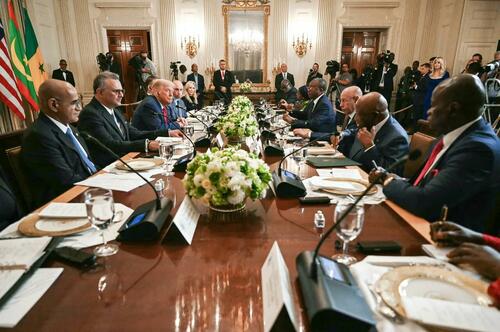 Президент Дональд Трамп (3-й л) присоединяется к многостороннему обеду с африканскими лидерами в Белом доме 9 июля 2025 года. Трамп принимает глав государств из Сенегала, Либерии, Гвинеи-Бисау, Мавритании и Габона на саммит, направленный на укрепление торговых связей и противодействие растущему региональному влиянию России и Китая. Джим Уотсон/AFP с помощью Getty Images
Президент Дональд Трамп (3-й л) присоединяется к многостороннему обеду с африканскими лидерами в Белом доме 9 июля 2025 года. Трамп принимает глав государств из Сенегала, Либерии, Гвинеи-Бисау, Мавритании и Габона на саммит, направленный на укрепление торговых связей и противодействие растущему региональному влиянию России и Китая. Джим Уотсон/AFP с помощью Getty ImagesСогласно отчету, Африка является домом для трех стран, которые входят в число стран с наибольшим количеством пользователей TikTok, а именно Кении, Нигерии и Южной Африки. Это также три крупнейшие экономики Африки, в которые Китай инвестирует миллиарды долларов.
По мере того, как влияние Китая расширяется в Африке, сказал Вассерман, ТикТок также оказывает «глубокое» влияние на жизнь африканцев.потому что информация, которую они переваривают, «предназначена для изменения того, как они рассматривают мировые события и, что более важно, как они рассматривают Китай. "
Влиятельница, которая говорила анонимно, сказала, что ей часто платят за размещение информации, которая изображает Китай как «жертву западного расизма» и за материал, который «рисует картину коррумпированного Запада и насколько она полна лицемерия». "
Это соответствует исследованиям, недавно завершенным учеными Лондонской школы экономики и политических наук, Университета Дюка Куньшаня в Китае и Университета Гюстава Эйфеля во Франции.
Они предполагают, что есть «четыре рамки», используемые влиятельными лицами для защиты или продвижения коммунистического Китая.
"Западное лицемерие обвиняет Запад в двойных стандартах«Западная угроза» представляет Запад как главную угрозу глобальной безопасности и росту; «Системное превосходство» продвигает политическую модель китайского режима впереди западных моделей; и «Общая судьба» предполагает процветающее будущее, разделяемое глобальными партнерами коммунистического Китая.
"Мы утверждаем, что, хотя политическая принадлежность этих влиятельных лиц остается неоднозначной и трудно определяемой, они де-факто стали участниками стремления Китая к глобальной репутации в цифровую эпоху.Эксперты пишут.
Вассерман сказал, что согласен с выводами.
"Это именно то, что я вижу, распространяемое этими влиятельными лицами; что угодно, от яростного антиамериканизма до вашего более доброкачественного «Китай — отличное место для отдыха».- сказал он.
Хамза Ибрагим, исследователь средств массовой информации и аналитик по дезинформации в Нигерии, сказал, что влиятельные лица предпочитают использовать TikTok, потому что они считают его «безопасным убежищем». Они считают, что, поскольку платформа принадлежит китайской компании, а их кураторы также являются китайцами, они могут свободно выражать прокитайские взгляды и создавать контент на платформе.
«В Африке широко признано, что TikTok — это китайская компания, которая работает с благословения китайского правительства, и люди, похоже, совсем не против этого», — сказал Ибрагим.
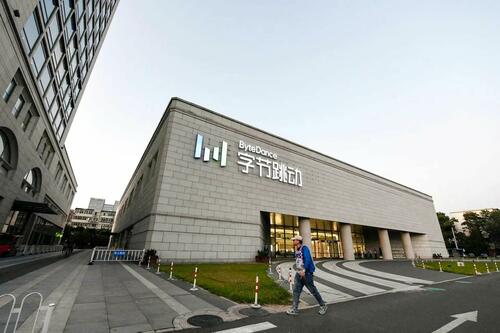 Мужчина проходит мимо штаб-квартиры ByteDance, материнской компании TikTok, в Пекине 16 сентября 2020 года. Согласно июньскому отчету Оксфордского института Reuters, TikTok является главным источником дезинформации в Африке, где Пекин расширяет свое влияние на политику, бизнес и общественное мнение. Грег Бейкер/AFP с помощью Getty Images
Мужчина проходит мимо штаб-квартиры ByteDance, материнской компании TikTok, в Пекине 16 сентября 2020 года. Согласно июньскому отчету Оксфордского института Reuters, TikTok является главным источником дезинформации в Африке, где Пекин расширяет свое влияние на политику, бизнес и общественное мнение. Грег Бейкер/AFP с помощью Getty ImagesПекинская компания ByteDance, владеющая TikTok, отрицает, что китайский режим контролирует ее.
Хьюман Райтс Вотч является одной из многих групп, которые скептически относятся к независимости TikTok.
В заявлении в 2023 году HRW заявила, что, хотя платформа официально является частным предприятием, «отказ от контроля со стороны китайского правительства может быть небезопасным вариантом для руководителей компании в Китае, учитывая послужной список правительства, наказывающего руководителей бизнеса страны за то, что они не придерживаются партийной линии. "
В 2022 году исследование Mozilla Foundation показало, что TikTok использовался для распространения языка ненависти больше, чем любая другая платформа перед выборами того года в Кении, которая, как и другие в стране, была омрачена этническим насилием.
«В то время как более зрелые платформы, такие как Facebook и Twitter, получают наибольшее внимание в этом отношении, TikTok в значительной степени остается недооцененным, несмотря на проведение некоторых из самых драматических кампаний по дезинформации», — говорится в отчете фонда.
Читайте остальное здесь...
Тайлер Дерден
Свадьба, 08/06/2025 - 05:00













